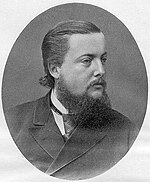List of Classical Philologists in Giessen
The list of classical philologists in Giessen includes well-known university professors in this subject at Ludwigs University (1607–1945) and at Justus Liebig University (since 1957).
overview
The Classical Philology evolved in casting, as in other places also, from the chairs of rhetoric ( professor eloquentiae or oratoriae ) and poetry ( professura poeseos that also existed during the relocation of the University of Marburg (1624-1650)). After the death of the first professor of poetry, Conrad Bachmann (1646), the professorships were merged. Until the late 18th century this chair was held mainly by theologians, rarely historians and philologists. Classical philology has established itself as an independent discipline in Giessen since the 19th century. It was represented in particular by Friedrich Gottlieb Welcker , who taught rhetoric and poetics as a personal professor alongside professors from 1809 to 1816. Under his leadership, the Seminar for Classical Philology was established on March 20, 1812, the first institution of its kind at Giessen University. Theology professor Johann Ernst Christian Schmidt was appointed its first director . The professorship for rhetoric and poetics was rededicated to classical philology. Various private lecturers and associate professors supplemented the lecturing activities of the full professors. From 1878 to 1882, for example, Friedrich Schulteß led the exercises in the newly established proseminar as associate professor.
From the 1890s, the chairs in Giessen were only occupied for a short time and developed into “transit stations” for rising philologists. The growing number of students from 1900 onwards led to the establishment of an assistant position next to the ordinaries, which existed from 1903 to 1945. Its owners were Hugo Hepding (1903–1904), Wilhelm Gundel (1904–1906), Wilhelm Süß (1906–1909), Hermann Knöllinger (1909–1914), Robert Arnold Fritzsche (1915–1919), Hans Kling (1919–1927) ), Rudolf Güngerich (1927–1929), Andreas Thierfelder (1929–1930) and Heinrich Otto Schröder (1930–1945). Since the 1920s, the ordinaries began to have longer terms of office.
Towards the end of the Second World War , the University of Giessen was badly damaged in air raids. The professor for Latin studies, Andreas Thierfelder , was drafted into the armed forces in 1943 and was taken prisoner of war in 1945. The professor for Greek studies, Albrecht von Blumenthal , committed suicide shortly before the city was conquered by the Americans. The university was closed in 1946 and only rebuilt in 1957. For Classical Philology, two professorships were established in 1962 with a focus on Latin and Greek studies , which still exist today. In addition to the professors, there are several academic assistants, employees, academic advisers and lecturers at the Department of Classical Philology.
List of Professores poeseos et eloquentiae
The professors worked in Marburg from 1625 to 1650. Until 1646 they carried the title of Professor eloquentiae or oratoriae , from 1646 (death of Professor poeseos Conrad Bachmanns) the title of Professor eloquentiae et poeseos . The owners of these professors were mostly historians and theologians and rarely pursued philological studies.
- Caspar Fink (1605–1607)
- Petrus Hermannus Nigidius (1608–1616)
- Christian Liebenthal (1616–1624)
- Johannes Kornemann (1625–1627) in Marburg
- Theodor Höpingk (1627–1635) in Marburg
- Johann Balthasar Schupp (1635–1646) in Marburg
- David Christiani (1646–1650) in Marburg
- Johann Helwig Sinolt (1650-1653)
- Philipp Ludwig Hanneken (1663-1670)
- Heinrich Phasian (1671–1694)
- Johann Reinhard Hedinger (1694–1699)
- Matthias Nicolaus Kortholt (1700–1725)
- Johannes Rhenius (1725–1733)
- Johann Hermann Benner (1733–1740)
- Franz Justus Kortholt (1741–1743)
- Ernst Thom (1744–1745)
- Heinrich Christoph Nebel (1745–1752)
- Johann Gottfried Zentgrav (1753–1762)
- Johann Georg Bechtold (1762–1771)
- Christian Heinrich Schmid (1771–1800)
- Christian Gottlieb Kühnöl (1801–1809)
- Friedrich Karl Rumpf (1809–1823)
List of Classical Philologists
The following list starts at the beginning of the 19th century, because Classical Philology was established as an independent subject in Giessen at that time.
The first column shows the name of the person and their life data, the second column shows entry into the university, and the third column shows their departure. Column four names the highest position achieved at the University of Giessen. At other universities, the corresponding lecturer may have made an even more extensive scientific career. The next column names special features, the career path or other information relating to the university or the seminar. In the last column there are pictures of the lecturers.
|
Chair holder
Ludwig University (until 1945)
First ordinariate:
- Friedrich Carl Rumpf (1809–1823)
- Friedrich Gotthilf Osann (1825-1858)
- Ludwig Lange (1859–1871)
- Eduard Lübbert (1871–1874)
- Adolf Philippi (1874-1893)
- Eduard Schwartz (1893-1897)
- Albrecht Dieterich (1897–1903)
- Erich Bethe (1903-1906)
- Alfred Körte (1906–1913)
- Rudolf Herzog (1913-1936)
- Albrecht von Blumenthal (1940–1945)
Second ordinariate:
- Heinrich Friedrich Pfannkuche (1803-1832)
- Wilhelm Clemm (1874-1883)
- Johannes Schmidt (1883-1892)
- Richard Reitzenstein (1892-1893)
- Gotthold Gundermann (1893–1902)
- Richard Wünsch (1902–1907)
- Otto Immisch (1907-1913)
- Karl Kalbfleisch (1913–1934)
- Wilhelm Süß (1934–1940)
- Andreas Thierfelder (1941–1943)
Justus Liebig University (since 1957)
Full Professor of Greek Studies:
- Gerhard Müller (1962–1976)
- Egert Pöhlmann (1976–1980)
- Manfred Landfester (1980-2002)
- Peter von Möllendorff (since 2003)
Full Professor of Latin Studies:
- Vinzenz Buchheit (1962–1989)
- Jochem Küppers (1990–1997)
- Helmut Krasser (since 1999)
literature
- Hans Georg Gundel : Classical Philology at the University of Gießen in the 20th century , in: Heinz Hungerland (Ed.): Ludwigs University - Justus Liebig University, 1607–1957: Festschrift for the 350th anniversary , Giessen 1957, p. 192-221. Full text (PDF; 2.3 MB)
Web links
Individual evidence
- ↑ The ten-year gap after his departure has not been clarified. Gundel (1957) 215.
- ↑ Compare the entry on Johannes Rhenius in Kalliope







